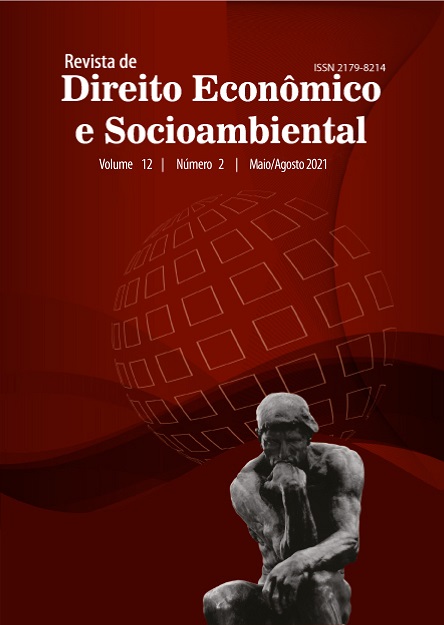Legal Aspects of Licensing by Adhesion and Commitment (LAC)
DOI:
https://doi.org/10.7213/rev.dir.econ.soc.v12i2.28564Keywords:
environment, environmental license, adherence and commitment, constitutionality, environmental planning.Abstract
The present paper intends to analyze the legal aspects of Environmental Licensing by Commitment (LAC), from the constitutional and legal provisions on the subject. Therefore, the conceptual bases of the institute and its purpose are exposed. Then, faced with the problems brought to the Judiciary, notably to the Federal Supreme Court, two questions are answered: the LAC is constitutional, even if provided for by a municipal or state normative act, as well as what are the requirements to implement it. The deductive and exploratory method was applied to reach the conclusions presented at the end.
Downloads
References
ATIQ, Emad H. Why motives matter: reframing the crowding out effect of legal incentives. Yale Law Journal. New Haven: Yale Law School, v. 123, n. 4, 2014.
BARACHO, José Alfredo de Oliveira. O princípio da subsidiariedade – conceito e evolução. Rio de Janeiro: Forense, 1997.
BRAITHWAITE, John. Enforced Self-Regulation: A New Strategy for Corporate Crime Control. Michigan Law Review. Michigan, v. 80, n. 7, jun. 1982.
BRASIL. Supremo Tribunal Federal. Ação Direta de Inconstitucionalidade nº 4.615-CE. Requerente: Procurador-Geral da República. Interessados: Governador do Estado do Ceará e Assembleia Legislativa do Estado do Ceará. Rel. Min. Roberto Barroso, DF, 28 de outubro de 2019. Disponível em: https://redir.stf.jus.br/paginadorpub/paginador.jsp?docTP=TP&docID=751257523. Acesso em: 29 de agosto de 2021c.
BRASIL. Supremo Tribunal Federal. Ação Direta de Inconstitucionalidade nº 5.312-TO. Requerente: Procurador-Geral da República. Interessados: Governador do Estado do Tocantins e Assembleia Legislativa do Estado do Tocantins. Rel. Min. Alexandre de Moares, DF, 25 de outubro de 2018. Disponível em: https://redir.stf.jus.br/paginadorpub/paginador.jsp?docTP=TP&docID=749117787. Acesso em: 29 de agosto de 2021a.
BRASIL. Supremo Tribunal Federal. Ação Direta de Inconstitucionalidade nº 5.475-AP. Requerente: Procurador-Geral da República. Interessados: Governador do Estado do Amapá e Assembleia Legislativa do Estado do Amapá. Rel. Min. Cármen Lúcia, DF, Pleno, 20 de abril de 2020. Disponível em: https://redir.stf.jus.br/paginadorpub/paginador.jsp?docTP=TP&docID=752833801. Acesso em: 29 de agosto de 2021.
BRASIL. Supremo Tribunal Federal. Ação Direta de Inconstitucionalidade nº 5.996-AM. Requerente: Associação Brasileira da Indústria de Higiene Pessoal, Perfumes e Cosméticos. Interessado: Mesa Diretora da Assembleia Legislativa do Estado do Amazonas. Amicus Curaie: Humane Society International – HS. Rel. Min. Alexandre de Moraes, DF, 15 de abril de 2020. Disponível em: https://redir.stf.jus.br/paginadorpub/paginador.jsp?docTP=TP&docID=752545435. Acesso em: 29 de agosto de 2021d.
BRASIL, Supremo Tribunal Federal. Informativo nº 989. Brasília, DF, Disponível em: http://www.stf.jus.br/arquivo/informativo/documento/informativo989.htm. Acesso em: 29 de agosto de 2021.
BROWNSWORD, Roger, e GOODWIN, Morag. Law and the Technologies of the Twenty-First Century: Text and Materials. Cambridge: Cambridge University Press, 2012.
CANOTILHO, José Joaquim. Direito constitucional. Coimbra: Almedina, 1993.
CHEVALLIER, Jacques. O Estado pós-moderno. Belo Horizonte: Fórum, 2009.
CORVALÁN, Juan Gustavo. Digital and Intelligent Public Administration: transformations in the Era of Artificial Intelligence. A&C – Revista de Direito Administrativo & Constitucional. Belo Horizonte: Fórum, ano 18, n. 71, jan./mar. 2018.
FREITAS, Juarez. Discricionariedade administrativa e direito fundamental à boa administração. São Paulo: Malheiros, 2007.
GUTWIRTH, Serge; DE HERT, Paul; DE SUTTER, Laurent. The trouble with technology regulation from a legal perspective. Why Lessig’s ‘optimal mix’ will not work. Oxford Regulating Technologies. Legal Futures, Regulatory Frames and Technological Fixes. 2008. Disponível em: http://works.bepress.com/serge_gutwirth/1/. Acesso em 29 ago. 2021.
HACHEM, Daniel Wunder; FARIA, Luzardo. Regulação jurídica das novas tecnologias no Direito Administrativo brasileiro: impactos causados por Uber, WhatsApp, Netflix e seus similares. Revista Brasileira de Direito. Passo Fundo: IMED, v. 15, n. 3, dez. 2019.
HEINEN, Juliano. Curso de direito administrativo. Salvador: Juspodivm, 2021.
HEINEN, Juliano e NÓBREGA, Marcos Rios. A administração Pública pós-Covid: transparência 2.0, blockchain e smart contracts. O Estadão. Publicado em 28 jul. 2020. Disponível em: https://politica.estadao.com.br/blogs/fausto-macedo/a-administracao-publica-pos-covid-transparencia-2-0-blockchain-e-smart-contracts/. Acesso em: 29 ago. 2021.
HORTA, Raul Machado. Direito constitucional. Belo Horizonte: Del Rey, 2003.
LIMA, André. Zoneamento Ecológico-Econômico à luz dos direitos socioambientais Curitiba: Juruá, 2006.
MACHADO, Paulo Affonso Leme. Direito ambiental brasileiro. São Paulo: Malheiros, 2000.
MARRARA, Thiago. Direito administrativo e novas tecnologias. Revista de Direito Administrativo. Rio de Janeiro: FGV, v. 256, jan./abr. 2011.
MEDAUAR, Odete. Direito administrativo moderno. São Paulo: Revista dos Tribunais, 2016.
MELLO, Celso Antônio Bandeira de. Curso de direito administrativo. São Paulo: Malheiros, 2009.
MILARÉ, Edis. Direito do ambiente. São Paulo: Revista dos Tribunais, 2004.
PARTIDÁRIO, Maria do Rosário. Introdução ao ordenamento do território Lisboa: Universidade Aberta, 1999.
SOUZA, Marcelo Pereira. Instrumentos de gestão ambiental: fundamentos e prática. São Carlos: Editora Riani Costa, 2000.
TORRES, Sílvia Faber. O princípio da subsidiariedade no direito público contemporâneo. Rio de Janeiro: Renovar, 2001.
Downloads
Published
How to Cite
Issue
Section
License
Authors who publish in this Journal agree to the following terms:
- Authors retain copyright and grant the Journal of Economic and Socio-Environmental Law the right of first publication with the article simultaneously licensed under the Creative Commons - Attribution 4.0 International which allows sharing the work with recognition of the authors and its initial publication in this Journal.
- Authors are able to take on additional contracts separately, for non-exclusive distribution of the version of the paper published in this Journal (eg.: publishing in institutional repository or as a book), with a recognition of its initial publication in this Journal.
- Authors are allowed and encouraged to publish their work online (eg.: in institutional repositories or on their personal website) at any point before or during the submission process, as it can lead to productive exchanges, as well as increase the impact and the citation of the published work (see the Effect of Open Access).





















